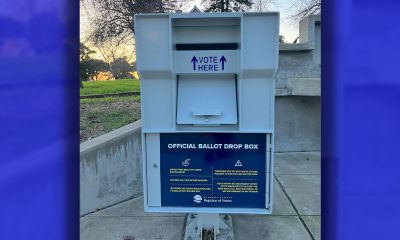News
No Charges Against Cop Whose Conduct Led to Oscar Grant’s Death
According to the New York Times, O’Malley released a report saying that Pirone, who was removed from the BART police force in 2010, will not be charged because he neither killed Grant nor aided and abetted Johannes Mehserle, who was convicted of manslaughter in a Southern California court in 2010.


Oscar Grant Mural at Fruitvale BART station
The family of Oscar Grant was disappointed with the decision by the Alameda County District Attorney’s Office to decline to press charges against the former transit police officer whose conduct led to Grant’s shooting death on New Year’s Day in 2009.
Nancy O’Malley, who had agreed to review the conduct of officer Anthony Pirone in October and perhaps file charges against him, made the announcement on Tuesday morning in response to pressure brought by the Grant family last month.
According to the New York Times, O’Malley released a report saying that Pirone, who was removed from the BART police force in 2010, will not be charged because he neither killed Grant nor aided and abetted Johannes Mehserle, who was convicted of manslaughter in a Southern California court in 2010.
“Although Pirone’s conduct was aggressive, utterly unprofessional, and disgraceful, it did not rise to the mental state required for murder,” O’Malley said in a statement.
It was Pirone who responded to a fight on a BART train carrying passengers from New Year’s Eve celebrations. Bystanders recorded the encounter using their cell phones and witnesses also described Pirone’s encounter with Grant. Pirone pulled Grant from the train violently, struck him for no reason and was heard using racial epithets while kneeling on Grant’s neck as Grant lay face down.
Once Grant was able to place his hands behind his back, Mehserle shot him and claimed the shooting was an accident having intended to use his Taser to restrain an already cooperating Grant who died a few hours later. His death set off mass protests in Oakland.
“In view of everything we have considered — and reconsidered — we conclude that we cannot prove Pirone guilty beyond a reasonable doubt,” O’Malley said. “We condemn Pirone’s conduct but we cannot charge him with murder or any other crime.”
The family of Oscar Grant had hoped for justice because the report about Pirone had recently been released after nearly 10 years.
That report placed much of the blame for Grant’s death on the “actions of Officer Pirone,” which “started a cascade of events that ultimately led to the shooting of Grant.”
“In view of everything we have considered — and reconsidered — we conclude that we cannot prove Pirone guilty beyond a reasonable doubt,” O’Malley said. “We condemn Pirone’s conduct but we cannot charge him with murder or any other crime.”
A misdemeanor charge of assault under the color of authority was also ruled out now because the statute of limitations had expired.
Oscar Grant’s mother, Rev. Wanda Johnson, and other family members had hoped for a different outcome, given the revelations of the report. “My son laid on the cold concrete with that Officer Pirone’s knee on his neck,” she said. “My son’s head was smashed against the wall and he was kicked and he was pushed. Pirone still walks around free today.”
BART board members and Oakland City Council members also did not take the news well, condemning O’Malley’s decision and calling upon her to reconsider.
“I want to be clear that Nancy O’Malley has failed, yet again, to do her job,” Simon said at a Tuesday morning news conference. “And that job was to ensure equal justice under the law.”
Simon, Bevan Dufty, Janice Li and Rebecca Saltzman planned to urge the full BART board to file a resolution urging O’Malley to charge Pirone.
“The D.A. could have a change of mind and the BART board should go on record that there cannot be justice until Mr. Pirone is held accountable for his violence and creating the chaos that led to Oscar Grant’s murder,” Dufty said.
District 6 Councilmember Loren Taylor planned to introduce a resolution calling on O’Malley to charge Pirone. It was co-sponsored by City Council President Nikki Fortunato Bas, and councilmembers Carroll Fife and Treva Reid.
Grant’s family will also continue to pressure O’Malley who did agree to a meeting next week.
“We will leave no stone unturned,” said Grant family attorney Charles Bonner. “We will go to the state Attorney General and we will also go to the federal justice department to seek federal criminal prosecution for civil rights violations, and we ultimately will go to the voters if Nancy O’Malley does not do the right thing.”
The Root, New York Times, Bay Area News, Bay City News, Associated Press, KTVU-News and Miami Herald were sources for this report.
Activism
Oakland Post: Week of April 17 – 23, 2024
The printed Weekly Edition of the Oakland Post: Week of April 17 – 23, 2024

To enlarge your view of this issue, use the slider, magnifying glass icon or full page icon in the lower right corner of the browser window. ![]()
California Black Media
Yahushua’s Law: Senate Advances Bill to Protect Students from Extreme Weather
In a significant move towards student safety, the California Senate Education Committee passed Senate Bill (SB) 1248, also known as Yahushua’s Law, on April 3. The bill is named in memory of Yahushua Robinson, a 12-year-old student from Lake Elsinore, who tragically died due to a heat-related illness during a physical education class in 2023. It is a pioneering effort to prevent similar incidents in the future.

By California Black Media
In a significant move towards student safety, the California Senate Education Committee passed Senate Bill (SB) 1248, also known as Yahushua’s Law, on April 3.
The bill is named in memory of Yahushua Robinson, a 12-year-old student from Lake Elsinore, who tragically died due to a heat-related illness during a physical education class in 2023. It is a pioneering effort to prevent similar incidents in the future.
Authored by Senator Melissa Hurtado (D-Bakersfield) and co-authored by Assemblymember Akilah Weber, M.D. (D-La Mesa), SB 1248 directs the California Department of Education to develop comprehensive guidelines for schools regarding student activity during all extreme weather conditions.
“No student should ever lose their life on campus to extreme weather when we can take steps to protect them by preparing statewide plans to minimize exposure to the most harmful elements of exposure,” Hurtado said after introducing SB 1248.
The bill stipulates that schools must implement safety measures which include monitoring weather forecasts, postponing or relocating outdoor activities during hazardous conditions, and ensuring students have proper hydration and access to shade. It also requires schools to establish clear communication plans to keep parents, teachers, and students informed about potential weather hazards.
Supporters of the bill include the Robinson family, advocate Christina Laster, Bold Enterprises LLC, California Black Women’s Collective Empowerment Institute, Familias Empoderadas del Valle Central National Action Network, The Black Student Advocate, and the Ventura County Alumnae Chapter of Delta Sigma Theta Sorority.
Thanking Hurtado for introducing this crucial legislation, Weber said, “The story of Yahushua Robinson last year was heartbreaking. We have protections for farm workers and other industries in the case of extreme weather, now climate change is forcing us to also extend similar protections to students at school.”
Barbara Lee
Congresswoman Barbara Lee Issues Statement on Deaths of Humanitarian Aid Volunteers in Gaza
On April 2, a day after an Israeli airstrike erroneously killed seven employees of World Central Kitchen (WCK), a humanitarian organization delivering aid in the Gaza Strip, a statement was release by Rep. Barbara Lee (D-CA-12). “This is a devastating and avoidable tragedy. My prayers go to the families and loved ones of the selfless members of the World Central Kitchen team whose lives were lost,” said Lee.

By California Black Media
On April 2, a day after an Israeli airstrike erroneously killed seven employees of World Central Kitchen (WCK), a humanitarian organization delivering aid in the Gaza Strip, a statement was release by Rep. Barbara Lee (D-CA-12).
“This is a devastating and avoidable tragedy. My prayers go to the families and loved ones of the selfless members of the World Central Kitchen team whose lives were lost,” said Lee.
The same day, it was confirmed by the organization that the humanitarian aid volunteers were killed in a strike carried out by Israel Defense Forces (IDF). Prior to the incident, members of the team had been travelling in two armored vehicles marked with the WCF logo and they had been coordinating their movements with the IDF. The group had successfully delivered 10 tons of humanitarian food in a deconflicted zone when its convoy was struck.
“This is not only an attack against WCK. This is an attack on humanitarian organizations showing up in the direst situations where food is being used as a weapon of war. This is unforgivable,” said Erin Gore, chief executive officer of World Central Kitchen.
The seven victims included a U.S. citizen as well as others from Australia, Poland, the United Kingdom, Canada, and Palestine.
Lee has been a vocal advocate for a ceasefire in Gaza and has supported actions by President Joe Biden to airdrop humanitarian aid in the area.
“Far too many civilians have lost their lives as a result of Benjamin Netanyahu’s reprehensible military offensive. The U.S. must join with our allies and demand an immediate, permanent ceasefire – it’s long overdue,” Lee said.
-

 Activism4 weeks ago
Activism4 weeks agoOakland Post: Week of March 20 – 26, 2024
-

 #NNPA BlackPress3 weeks ago
#NNPA BlackPress3 weeks agoCOMMENTARY: D.C. Crime Bill Fails to Address Root Causes of Violence and Incarceration
-

 #NNPA BlackPress3 weeks ago
#NNPA BlackPress3 weeks agoMayor, City Council President React to May 31 Closing of Birmingham-Southern College
-

 #NNPA BlackPress3 weeks ago
#NNPA BlackPress3 weeks agoCOMMENTARY: Lady Day and The Lights!
-

 #NNPA BlackPress3 weeks ago
#NNPA BlackPress3 weeks agoFrom Raids to Revelations: The Dark Turn in Sean ‘Diddy’ Combs’ Saga
-

 #NNPA BlackPress3 weeks ago
#NNPA BlackPress3 weeks agoBaltimore Key Bridge Catastrophe: A City’s Heartbreak and a Nation’s Alarm
-

 #NNPA BlackPress3 weeks ago
#NNPA BlackPress3 weeks agoBaltimore’s Key Bridge Struck by Ship, Collapses into Water
-

 Activism3 weeks ago
Activism3 weeks agoOakland Post: Week of March 27 – April 2, 2024



















































